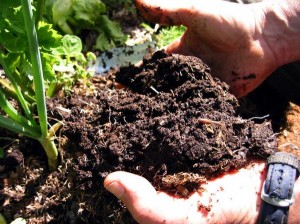
 Mulching improves your soil. Pure and simple. Mulching is where dead leaves branches and dead plant material breaks down on the surface of the soil and is recycled through the soil to feed plants and gardens. Mulching also conserves water, saving time, money and other resources.
Mulching improves your soil. Pure and simple. Mulching is where dead leaves branches and dead plant material breaks down on the surface of the soil and is recycled through the soil to feed plants and gardens. Mulching also conserves water, saving time, money and other resources.
What is mulch?
Mulch is garden waste – leaves, grass clippings, weeds, prunings, sticks and branches, and even old newspapers – which can be broken down by nature to enrich soil and feed plants and trees.
How do you mulch?
- Place garden waste on the top layer of soil and around plants and trees. A 10cm layer is sufficient. Avoid placing mulch right against plant and tree stems – always leave a small gap.
- As the mulch breaks down into the soil over time, add more mulch to the top layer.
- A mix of garden waste if best, rather than one type of material.
Compost feeds your plants and trees with the best chemical-free fertiliser known to exist.
What is compost?
Compost is a soil-like material that is the end result of the controlled breakdown of plant matter. Compost can be used as a potting mix, a soil conditioner or simply as mulch.
What are the benefits of compost?
- Compost promotes health plant growth
- It improves soil structure and ecology
- It feeds beneficial organisms which help to suppress plant and soil diseases
- Used as a mulch, it suppresses weeds and holds water in the soil longer
- It reduces the amount of greenhouse gases (GHG) produced and emitted from green waste which usually goes into landfills
 Composting at home
Composting at home
Setting up your own compost system at home is easy and doesn’t take a lot of time. It can take as little as 10 minutes a month! You can achieve great quality compost by following some basic common sense guidelines. It’s really easy!
Location and method of your compost bin
Choose a sunny, well-drained location if possible.
Next, decide what method of composting is best for you. The choices are:
Compost heap – the cheapest option. Garden waste only. Turn over with a garden fork once a fortnight. Compost is ready in 3-4 months.
Enclosed compost bay (with pallets, for example) – low cost option. Garden waste only. Turn over with a garden fork every fortnight. Compost is ready in 3-4 months.
Compost bin – medium cost. Garden waste, food scraps, newspaper. Turn over with a garden fork once a fortnight. Compost is ready in 3-4 months.
Compost barrel or tumbler – can be more expensive. Garden waste, kitchen scraps and other suitable materials. Roll or tumble weekly. Compost is ready in 14-21 days.
What to add to compost
An ideal compost mix is made up of roughly equal portions of materials rich in nitrogen and carbon, plus air and water.
Nitrogen rich matter includes: fruit and vegetable scraps, lawn clippings, green weeds, tea and coffee leftovers, egg shells and more.
Carbon rich matter includes: dry leaves, wood ash and charcoal, dried grass, small sticks and twigs, shredded newspaper and cardboard.
Ingredients to avoid
Do not add meat or fat, oils, noxious weeds, animal droppings (dog, cat, etc), thicker branches, palm fronds, rose cuttings, pine needles or prunings, eucalyptus material, treated timber, chemicals of any kind, garden waste sprayed with chemicals, or any matter than clearly won’t decompose.
How to mix these ingredients
- Ideally, build you compost in 10-15cm layers, alternating nitrogen (green) and carbon (brown) materials.
- Add a manure-based fertiliser (eg. animal manure, blood and bone, etc) to help start the composting process.
- Sprinkle a thin layer of soil between the layers each time you add material – this adds additional micro-organisms to your compost.
- Regularly turn over or mix your compost with a garden fork to aerate your compost. This will speed up the composting process.
- Add water to your compost mix. A balance is needed here, because too much water will rot the mix, and too little will dry it out. Compost mix needs to feel damp, but not wet. Adding water once a month is usually enough.
- When your compost heap, bay or bin is full, usually about 1m3 of material, cover and leave for 3-6 months. If you want, start another compost heap, to have regular amounts of compost available. An old blanket or carpet is an ideal cover. Weigh down with bricks or wood and hey presto, you’re composting!
How to use your compost
When your compost is ready for action, you can:
- Dig the compost into your garden beds
- Mix the compost in equal amounts with garden soil to make a potting mix
- Spread the compost evenly over soil and garden beds as mulch
- Or use it to top dress your lawn
Potential compost problems
- If your compost is too wet, add more dry leaves and dry material, such as newspaper. Overly wet compost will usually smell unpleasant.
- Wet or smelly compost can also indicate not enough air. If this happens, turn your compost more regularly to aerate and improve drainage, add a little more course material like twigs, sprinkle the compost with a little lime and mix in, and cover the compost to avoid rain soaking.
- If your compost is slow to process, it may mean there’s not enough active nutrients in the mix, or not enough air, or the compost is too dry. If this happens, add some compost ‘activator’ such as comfrey leaves, blood and bone, or a manure like chicken manure fertiliser. Again, turn over the mix regularly and water well until damp, but not wet.
- If you notice maggots, cockroaches or other vermin, such as mice or rats, in your compost, it can mean there’s too much ‘food scraps’ in your mix, like bread, grains, fruit, etc. Vermin also like a warm, dry place, so your compost may be too dry. If this happens, keep your compost more moist, add more lime, cover each layer with a good amount of garden soil, then leave for a week or two before turning over the mix again.
 Composting is about finding a balance, and once you get the hand of it, it’s becomes easier and more intuitive. Different seasons and weather conditions will require some fine-tuning, but overall, compost is easy, fast and very beneficial for your gardens, soil and the environment. Enjoy!
Composting is about finding a balance, and once you get the hand of it, it’s becomes easier and more intuitive. Different seasons and weather conditions will require some fine-tuning, but overall, compost is easy, fast and very beneficial for your gardens, soil and the environment. Enjoy!
For more info please contact Green Dean anytime, and for training, keep an eye out for our workshops coming up on worm farming, soil care, DIY organic fertilisers, permaculture and more. Visit www.greendean.com.au
